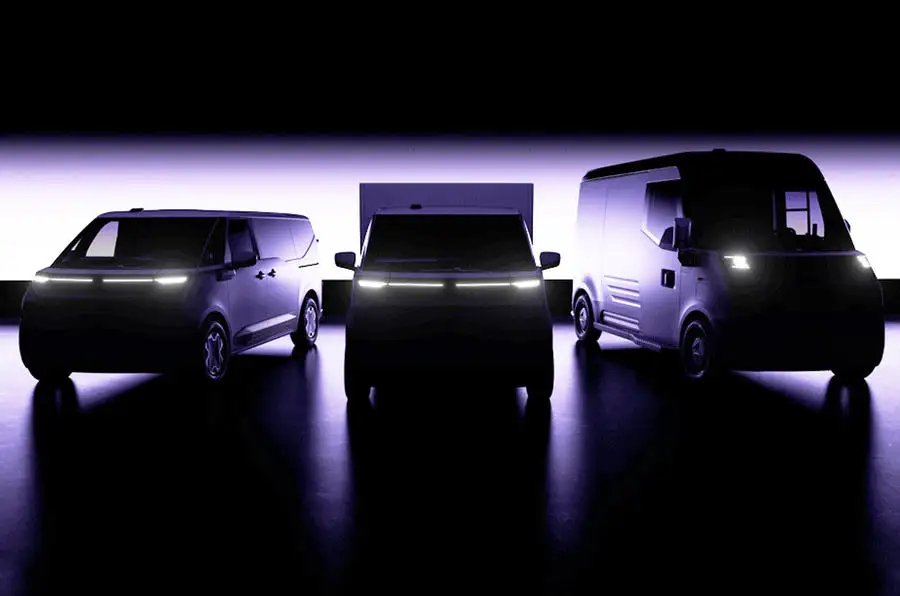Renault, Volvo Group partner on commercial EVs to be 'Tesla of vans'

Renault and lorry maker the Volvo Group have established a new start-up that aims to flip the European commercial vehicle sector on its head with a range of highly modular electric vans.
Called Flexis, it aims to capitalise on growth in demand for zero-emission commercial vehicles, which is expected by its creators to rise by 40% each year until 2030.
Explaining its ambitions, Renault Group CEO Luca de Meo said: “This is the Tesla of the commercial vehicle in a way. That's the way you have to see it.”
The first Flexis model – part of a three-van line-up teased in a press conference – will be launched in 2026. Based on a bespoke skateboard architecture, it was promised by de Meo to “completely transform” the common perception of a van.
“It’s not a white box on wheels with a diesel engine any more,” he said.
It will be a “step-in van” designed around last-mile deliveries in city centres, prioritising how efficiently it uses space as well as outright manoeuvrability. It will have a footprint roughly in line with the existing Renault Kangoo but with a much taller roofline to give a total cargo capacity matching the Renault Trafic from the segment above.
Those tight proportions will also ensure the van has a turning circle on a par with B-segment superminis, Renault suggested.
Flexis has also worked closely with logistics companies to optimise the interior packaging of its vans, with French freight firm CMA CGM taking a 10% stake in the business.
De Meo said this approach was inspired by Rivian, which developed its electric van with Amazon, and recently failed start-up Arrival, which partnered with UPS and Post Office.
The Flexis vans’ interiors have been designed to save as much time for their operators as possible.
De Meo explained: “We were trying to get every second out of interaction between the driver and the van, because every 30 seconds that you save in a delivery we estimate is [worth an extra] 1% profitability for the logistics operator.
“So you get into the van from the side; you don't have to go back and open the door. You will have a mechanism to order the packages based on the delivery route. Everything will be like this, because 30 seconds is 1% profitability.”
Flexis CEO Philippe Divry said that ease of operation is also a key consideration. He elaborated: “A lot of logistics companies see their drivers changing jobs after 12-18 months, so you have to imagine changing your whole workforce every 12-18 months.
“If we can make our vehicle more easy to drive, more friendly for people who deliver 100 or 150 packages a day, and we can keep them longer on the job, that's much more value, much less disturbance in the customer’s operation.”
He also suggested that Flexis’s software platform will be capable of learning a company’s routes and factoring in charging stops, reducing the burden on drivers.
All of Flexis’s vans will be based on a highly modular skateboard platform with 800V electricals – boosting charging speeds – and a choice of two battery pack sizes.
De Meo referred to the architecture’s adaptability as “lego-like” and Divry said it provides “a fantastic opportunity to build out globally”.
He added that it could be targeted at markets such as Brazil and North America, suggesting that a pick-up truck comparable to the Renault Alaskan (a badge-engineered Nissan Navara) could be on the cards.
De Meo said that the Flexis vans will initially be sold under the Renault Trucks brand. They will be offered to other brands as “white-label” products for rebadging, just as Renault’s existing vans are.
The start-up is currently in talks with Nissan, an Alliance partner of Renault, which currently sells the Kangoo as the Townstar.
Collaboration with third parties is key to making the project work. Equity in Flexis is currently split 45:45 between the Renault and Volvo groups, with CMA CGM taking the remaining 10%. The start-up continues to look for additional partners, however.
Flexis will also exploit economies of scale with the Renault Group’s cars wherever possible. Its vans will share batteries with Alpine’s performance EVs, for example, helping to fulfil the production capacity of Renault’s two gigafactories in northern France.
This gives the new division an edge over rival start-ups, de Meo said.
He explained: “When we [look] for a component for anything – for a steering wheel, for a seat, for a windscreen – we're pretty heavy, so we can make the thing very competitive in terms of cost. And that's the difference between inventing something new from a start-up: you have the big shoulders.”
